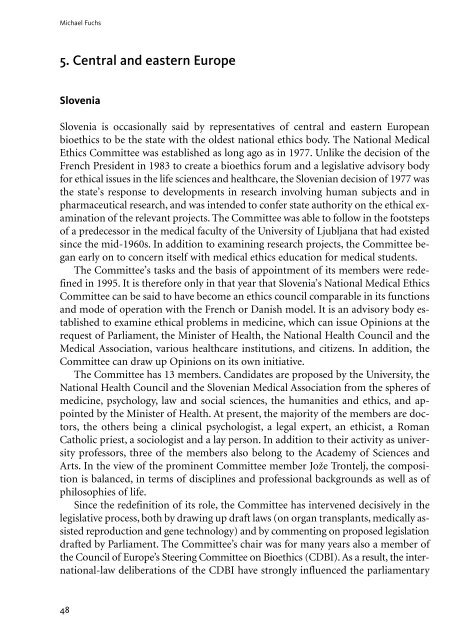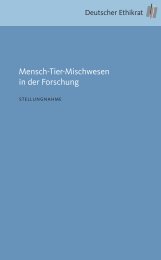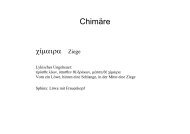Michael Fuchs National ethics councils - Deutscher Ethikrat
Michael Fuchs National ethics councils - Deutscher Ethikrat
Michael Fuchs National ethics councils - Deutscher Ethikrat
You also want an ePaper? Increase the reach of your titles
YUMPU automatically turns print PDFs into web optimized ePapers that Google loves.
<strong>Michael</strong> <strong>Fuchs</strong> <strong>National</strong> <strong>ethics</strong> <strong>councils</strong>. Their backgrounds, functions and modes of operation compared<br />
5. Central and eastern Europe<br />
Slovenia<br />
Slovenia is occasionally said by representatives of central and eastern European<br />
bio<strong>ethics</strong> to be the state with the oldest national <strong>ethics</strong> body. The <strong>National</strong> Medical<br />
Ethics Committee was established as long ago as in 1977. Unlike the decision of the<br />
French President in 1983 to create a bio<strong>ethics</strong> forum and a legislative advisory body<br />
for ethical issues in the life sciences and healthcare, the Slovenian decision of 1977 was<br />
the state’s response to developments in research involving human subjects and in<br />
pharmaceutical research, and was intended to confer state authority on the ethical examination<br />
of the relevant projects. The Committee was able to follow in the footsteps<br />
of a predecessor in the medical faculty of the University of Ljubljana that had existed<br />
since the mid-1960s. In addition to examining research projects, the Committee began<br />
early on to concern itself with medical <strong>ethics</strong> education for medical students.<br />
The Committee’s tasks and the basis of appointment of its members were redefined<br />
in 1995. It is therefore only in that year that Slovenia’s <strong>National</strong> Medical Ethics<br />
Committee can be said to have become an <strong>ethics</strong> council comparable in its functions<br />
and mode of operation with the French or Danish model. It is an advisory body established<br />
to examine ethical problems in medicine, which can issue Opinions at the<br />
request of Parliament, the Minister of Health, the <strong>National</strong> Health Council and the<br />
Medical Association, various healthcare institutions, and citizens. In addition, the<br />
Committee can draw up Opinions on its own initiative.<br />
The Committee has 13 members. Candidates are proposed by the University, the<br />
<strong>National</strong> Health Council and the Slovenian Medical Association from the spheres of<br />
medicine, psychology, law and social sciences, the humanities and <strong>ethics</strong>, and appointed<br />
by the Minister of Health. At present, the majority of the members are doctors,<br />
the others being a clinical psychologist, a legal expert, an ethicist, a Roman<br />
Catholic priest, a sociologist and a lay person. In addition to their activity as university<br />
professors, three of the members also belong to the Academy of Sciences and<br />
Arts. In the view of the prominent Committee member Jozˇe Trontelj, the composition<br />
is balanced, in terms of disciplines and professional backgrounds as well as of<br />
philosophies of life.<br />
Since the redefinition of its role, the Committee has intervened decisively in the<br />
legislative process, both by drawing up draft laws (on organ transplants, medically assisted<br />
reproduction and gene technology) and by commenting on proposed legislation<br />
drafted by Parliament. The Committee’s chair was for many years also a member of<br />
the Council of Europe’s Steering Committee on Bio<strong>ethics</strong> (CDBI). As a result, the international-law<br />
deliberations of the CDBI have strongly influenced the parliamentary<br />
48<br />
debate and opinion formation in Slovenia. To date, the Committee has prepared<br />
Opinions and reports on the following subjects: euthanasia, medically assisted suicide,<br />
the status of non-medical therapies, the refusal of blood transfusions for children<br />
of Jehovah’s Witnesses, the Convention for the Protection of Human Rights and<br />
Dignity of the Human Being with Regard to the Application of Biology and Medicine,<br />
therapeutic cloning, patients’ rights in terminal illness and palliative care, the<br />
use of placebos in studies of psychiatric drugs, and limitation of the treatment of patients<br />
in a permanent vegetative state.<br />
In addition, the Committee remains the central body responsible for the examination<br />
of research projects involving human subjects. In this field, the <strong>National</strong> Committee’s<br />
consent is required for all state-funded research projects for doctoral theses<br />
and also for clinical studies. The consent of a local <strong>ethics</strong> committee suffices only for<br />
Phase 4 clinical studies.<br />
Address<br />
<strong>National</strong> Medical Ethics Committee<br />
Institute of Clinical Neurophysiology, University Medical Center<br />
Zaloska 7, 1525 Ljubljana, Slovenia<br />
Bibliography<br />
CDBI (2001). Addendum to Developments in the Field of Bio<strong>ethics</strong> in Member States, other States and<br />
International Organisations: Slovenia. Recent Developments in the Field of Bio<strong>ethics</strong> in Slovenia<br />
(CDBI/INF 2001/4). Strasbourg, June 2001: 4.<br />
Trontelj, J. (1996). Statement of Jo_e V. Trontelj. In: <strong>National</strong> Bio<strong>ethics</strong> Advisory Commission (NBAC); <strong>National</strong><br />
Institutes of Health (NIH) (ed.). The International Summit of <strong>National</strong> Bio<strong>ethics</strong> Advisory Bodies […]<br />
San Francisco, California […] Thursday, November 21, 1996 […]: 68 – 72. Available online at:<br />
http://www.georgetown.edu/research/nrcbl/nbac/transcripts/1996/11-21-96.pdf<br />
Trontelj, J. (2000). Ethics Committees in Slovenia. In: Glasa, J.; Council of Europe (ed.). Ethics Committees in<br />
Central & Eastern Europe. Bratislava: 239 – 249.<br />
49




